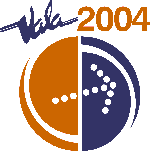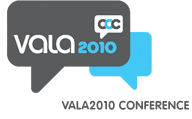https://drive.google.com/file/d/0BxlbeayLWxeRLXJUZ1VoZVBaa1k/view?usp=sharing
Tag Archives: Standards
VALA2004 Session 7 Jilovsky
Persistent URL: http://www.vala.org.au/vala2004-proceedings/vala2004-session-7-jilovsky
Unicode: a tool for system interoperability and human communicationVALA 2004 CONCURRENT SESSION 7: Software Issues Cathie JilovskyInformation Services Manager, CAVAL Collaborative Solutions |  |
Please tag your comments, tweets, and blob posts about this session: #VALA2004
Abstract
This paper describes the development of the Unicode standard, how it is being used by computer systems generally and by the library community in particular. The complexities of implementing a system which supports a multi-language environment are explored, using the implementation of the Ex Libris Aleph 500 library system at CAVAL Collaborative Solutions as a case study. CAVAL provides cataloguing services to customers in over fifty languages, so that the ability to handle Unicode was a key criterion in the selection of the system. Unicode is complex to implement but is becoming an essential component for library systems.
VALA2000 Session 9 Gatenby
Persistent URL: http://www.vala.org.au/vala2000-proceedings/vala2000-session-9-gatenby
Internet, Interoperability and Standards – Filling the GapsVALA 2000 CONCURRENT SESSION 9: Interoperability Janifer Gatenby |
Please tag your comments, tweets, and blob posts about this session: #VALA2000
Abstract
With major changes in electronic communications, the main focus of standardisation in the library arena has moved from that of supporting efficiency to allowing library users to access external resources and allowing remote access to library resources. There is a new emphasis on interoperability at a deeper level among library systems and on a grander scale within the environment of electronic commerce. The potential of full inter-operability is examined along with its likely impact. Some of the gaps in current standards are examined, with a focus on information retrieval, together with the process for filling those gaps, the interoperation of standards and overlapping standards.
VALA2010 Session 16 Butters
 Data sets, profiles and standards: creating interoperability & adding value to RFID within Australian libraries
Data sets, profiles and standards: creating interoperability & adding value to RFID within Australian libraries
VALA 2010 CONCURRENT SESSION 16 – Usability/Portability
Thursday 11 February 2010 14:55 – 15:25
Persistent URL: http://www.vala.org.au/vala2010-proceedings/vala2010-session-16-butters
 Alan Butters
Alan Butters
Principal Consultant, Sybis
http://www.sybis.com.au
Please tag your comments, tweets, and blog posts about this session: #VALA2010
- VALA2010 Session 16 Butters Paper 41.44 KB
- VALA2010 Session 16 Butters Presentation 448.70 KB
- VALA2010 Session 16 Butters Podcast 13.75 MB
Abstract
This paper provides an update on the status of the new ISO data model standard for libraries and explores some of the issues facing Australian libraries wishing to maximise the benefits offered by the new standard. The potential for data profiles to add value in the interoperability context is explored, as are the complexities involved with mixed data profiles at the point of circulation. Some suggested guidelines for the selection of data elements under the standard are also offered for consideration.

This work is licensed under a Creative Commons Attribution-NonCommercial License.
VALA2008 Session 10 Butters
 New RFID technologies & standards – what does it all mean for your library?
New RFID technologies & standards – what does it all mean for your library?
VALA 2008 CONCURRENT SESSION 10: Enabling Technologies
Wednesday 6 February 2008 14:00 – 14:30
Persistent URL: http://www.vala.org.au/vala2008-proceedings/vala2008-session-10-butters
Alan Butters
Principal Consultant, Sybis
http://www.sybis.com.au
Please tag your comments, tweets, and blob posts about this session: #VALA2008
Abstract
This paper explores practical issues of interest to libraries in two specific areas affecting RFID technology implementation the development of ISO standardisation and the debate over future technology platforms. Australian libraries are interested in knowing how they may plan for the emerging standardisation of the RFID tag data model and what this standardisation might mean for existing RFID systems. There is also growing debate about the relative merits of Ultra High Frequency (UHF) RFID systems, and whether this technology might form a future basis for library RFID systems.

 Data sets, profiles and standards: creating interoperability & adding value to RFID within Australian libraries
Data sets, profiles and standards: creating interoperability & adding value to RFID within Australian libraries